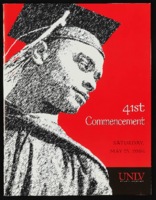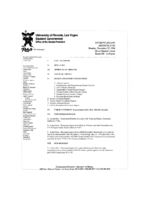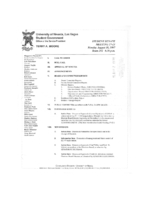Search the Special Collections and Archives Portal
Search Results
Stella Champo Iaconis Collection of Helldorado Photographs
Identifier
Abstract
The Stella Champo Iaconis Collection of Helldorado Photographs (approximately 1934-1940) contains four black-and-white photographic prints of the Helldorado Days celebration held in Las Vegas, Nevada. Images depict people celebrating at the Apache Bar in downtown Las Vegas.
Archival Collection
William J. Moore Jr. Photograph Collection
Identifier
Abstract
The William J. Moore Jr. Photograph Collection (approximately 1942-1960) consists of black-and-white photographic prints, negatives, and one oversize image depicting William "Bill" J. Moore Jr.'s career as a casino operator in Las Vegas, Nevada. Images include events at the Moore family home and the Hotel Last Frontier. Also included are images of Moore with politicians, casino operators, and other notable figures in Las Vegas.
Archival Collection
Paul Sarno oral history interview
Identifier
Abstract
Oral history interview with Paul Sarno conducted by David G. Schwartz on July 13, 2007 for the Remembering Jay Sarno Oral History Project. Sarno begins by discussing the Sarno family, his grandparents, their Jewish heritage, and the early life of his uncle, Jay Sarno, and his father. Sarno then describes how his uncle married a lot later than his older siblings and he was the only one who had personal hobbies such as golf. Sarno then chronicles his uncle’s role as a businessman in Las Vegas, Nevada and how he only visited Las Vegas once because his father was a gambling addict. Lastly, Sarno discusses everything he knew about his uncle’s relationship with Allen Dorfman, the Teamster’s Union, and his legal troubles with the Internal Revenue Service.
Archival Collection
Elton and Madelaine Garrett Photograph and Architectural Drawing Collection
Identifier
Abstract
The Elton and Madelaine Garrett Photograph and Architectural Drawing Collection contains photographic prints and architectural drawings of Boulder (Hoover) Dam; Las Vegas, Nevada; Boulder City, Nevada; and other locations in the American Southwest from approximately 1927 to 1990. The photographs primarily depict Hoover Dam's construction and areas around Hoover Dam, Las Vegas, and Boulder City during the 1930s and 1940s. The bulk of the architectural drawings and maps are projects and diagrams related to the planning and development of Boulder City, Nevada between 1943 and 1985.
Archival Collection
Jesus Jara (Clark County School District, Superintendent) oral history interview conducted by Magdalena Martinez and Elia Del Carmen Solano-Patricio: transcript
Date
Archival Collection
Description
From the Lincy Institute "Perspectives from the COVID-19 Pandemic" Oral History Project (MS-01178) -- Education sector interviews file.
Text

Alex de Castroverde oral history interview: transcript
Date
Archival Collection
Description
Oral history interview with Alex de Castroverde conducted by Monserrath Hernandez on April 17, 2019 for the Latinx Voices of Southern Nevada Oral History Project. In this interview, De Castroverde discusses his family's background and his parent's emigration story from Cuba to the United States. He talks about growing up in Reno, Nevada, his father becoming a lawyer, and attending the University of Nevada, Reno. De Castroverde remembers the establishment of De Castroverde Law Group, the significance his father had on the Hispanic community in Las Vegas, Nevada, and taking over operations of the law firm with his brother. Lastly, De Castroverde talks about his involvement with Cristo Rey St. Viator College Preparatory High School, the Guinn Center, and the Las Vegas Business Academy.
Text

University of Nevada, Las Vegas (UNLV) 41st commencement program
Date
Archival Collection
Description
Commencement program from University of Nevada, Las Vegas Commencement Programs and Graduation Lists (UA-00115).
Text

Transcript of interview with Elmer Hilsinger by Irene Rostine, October 2, 1991
Date
Archival Collection
Description
When Mr. Elmer Hilsinger arrived from the Los Angeles area in 1942, to work as a Refractory Inspector in the Engineering Department at Basic Magnesium Incorporated (BMI), little did he know the town site would grow to be known as Henderson, Nevadain a few short decades. Mr. Hilsinger’s oral history provides a glimpse of the work being done by women at BMI, including women working as chemists, truck drivers, and secretaries. His words attest to the strong work ethic demonstrated by women at the plant during the “war work” period. Through Mr. Hilsinger’s story, we are also provided with an account of what daily life was like for a married couple, including Mr. Hilsinger’s life with his wife who worked as a waitress at Anderson Camp. In addition, Mr. Hilsinger’s oral history touches on the evolution of safety rules within the plant, the transition from the American Federation of Labor Union to the Congress of Industrial Organizations Union, and the role prostitution played during the tim
Text

Meeting minutes for Consolidated Student Senate University of Nevada, Las Vegas, November 25, 1996
Date
Archival Collection
Description
Text

Meeting minutes for Consolidated Student Senate University of Nevada, Las Vegas, August 18, 1997
Date
Archival Collection
Description
Text
